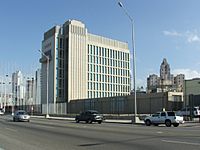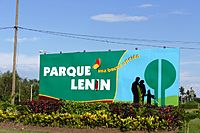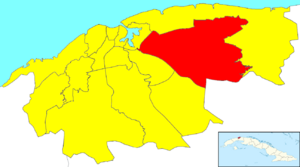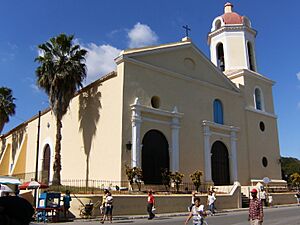Guanabacoa facts for kids
Quick facts for kids
Distrito de Guanabacoa
|
|||
|---|---|---|---|
| Guanabacoa | |||
  |
|||
|
|||
| Nickname(s):
Villa de Pepe Antonio
|
|||

Location of Guanabacoa in Havana
|
|||
| Country | |||
| Province | |||
| Founded | 1581 | ||
| Wards (Consejos Populares) | Chivas-Roble, Debeche-Nalon, Hata-Naranjo, Mañana-Habana Nueva, Minas-Barreras, Peñalver-Bacuranao, Villa I, Villa II | ||
| Area | |||
| • Total | 127 km2 (49 sq mi) | ||
| Population
(2022)
|
|||
| • Total | 128,666 | ||
| • Density | 1,013/km2 (2,624/sq mi) | ||
| Time zone | UTC-5 (EST) | ||
| Area code(s) | +53-7 | ||
Guanabacoa is a historic town located in eastern Havana, Cuba. It's one of the 15 areas, or boroughs, that make up the city. This place is famous for its rich history, especially its connection to Santería, a religion with African roots. It was also home to the first African Cabildo (a kind of community organization) in Havana.
In 1555, Guanabacoa briefly became the capital of Cuba. This happened after the city of Havana was attacked by a French pirate named Jacques de Sores. This event led to a Cuban saying: “Like putting Havana in Guanabacoa.” It means trying to fit something too big into a space that is too small. Guanabacoa was also the site of a battle in 1762. This fight between British and Spanish soldiers was part of the larger Battle of Havana during the Seven Years' War.
Contents
Exploring Guanabacoa's Location
The town of Guanabacoa is in the province of La Habana. It is about five kilometers (3.2 miles) southeast of Havana city. It lies south of the city of Regla. The town is built on a small hill and is surrounded by rivers.
Early Residents: Florida Indians
Guanabacoa was once home to a small group of Florida Indians. These were mainly Apalachees and Yamasees. They moved to Guanabacoa in 1764. This happened after the Seven Years' War ended, and they were evacuated from Florida along with Spanish forces.
The Jewish Community in Guanabacoa
It is not fully known when a Jewish community first formed in Guanabacoa. In the late 1920s, a man named Samuel Epstein started a company called Sedanita here. It made underwear, shawls, and scarves. This company employed 200 workers.
Other Jewish-owned factories also existed in Guanabacoa in the 1930s. One example was the factory of Charles Shapiro. His business grew well. By the 1940s, there was a Jewish Community in Guanabacoa. Their main meeting place was the Centro Israelita at Calle Martí 252. There was also a WIZO branch.
The Jewish community in Guanabacoa started to decline in the 1950s. Many people moved away after the Cuban Revolution.
Famous People from Guanabacoa
Many talented people were born or grew up in Guanabacoa.
Music Stars
Four famous Cuban musicians were born in this town:
- Ernesto Lecuona
- Rita Montaner
- Ignacio Villa, also known as Bola de Nieve
- Dinorah Rivas, a composer, writer, and actress. Her songs were played by famous artists like Tito Puente.
Sports and Media Figures
Four Major League Baseball players also came from Guanabacoa:
- Emilio Palmero (born 1895)
- Tony Ordeñana (born 1918)
- Rene Valdez (born 1929)
- Evelio Hernández (born 1931)
The well-known television news reporter Rick Sanchez was also born here.
Other Notable Residents
The Cuban singer, Lucrecia Saez Perez, spent her childhood in Guanabacoa. Many consider her a successor to the great Celia Cruz. The famous bodybuilder Sergio Oliva, known as “The Myth,” also lived here.
María Argelia Vizcaíno, a famous journalist, historian, and writer, was born in Guanabacoa. She wrote "Guanabacoa la Bella, Tomo I" (2006) and other books. You can find more information about her at María Argelia Vizcaíno.
Guanabacoa's Climate
Guanabacoa has a climate with a clear dry season. According to the Köppen Climate Classification system, it has a tropical savanna climate. This type of climate is often shown as "Aw" on climate maps.
See also
 In Spanish: Guanabacoa para niños
In Spanish: Guanabacoa para niños
 | Janet Taylor Pickett |
 | Synthia Saint James |
 | Howardena Pindell |
 | Faith Ringgold |




